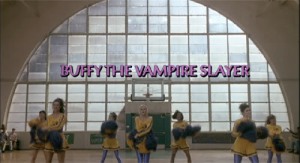
There’s this part in Buffy The Vampire Slayer (the movie, not the TV series) where Buffy is slow-dancing with Luke Perry, and he whispers into her ear “You’re not like other girls.” And Buffy replies “Yes I am.”
That exchange has been ringing in my head like a gong since 1992, and I’m still trying to figure out what it means.
In the movie’s context, it comes at a moment where Buffy doesn’t want to accept the responsibility of being a slayer, so the line is a moment of denial, a stall in the narrative, right before vampires attack the school dance and she has to take them out in a whirl of roundhouse kicks and flaming hairspray. It’s sort of the movie’s tagline: she can’t face her destiny, she’s afraid of being special, she just wants to be a regular teenager. But, like Ulysses or Arjuna or Luke Skywalker, she can’t escape the hero’s call. Even the title of the movie itself is basically a sight-gag that’s encapsulated and reaffirmed in her exchange with Pike: Buffy/Slayer. Regular girl/Vampire killer. Cheerleader/Warrior. It’s got a nice comedic ring, and it reflects basically every plotline since ancient Egypt: a character with some special quality who is called to a strange and wonderful destiny. This is the fundamental template of storytelling, if you believe Joseph Campbell.
But there are other levels where Pike and Buffy’s exchange vibrates in some weird and compelling way. In one sense, you can take it as literal truth – not that Buffy’s just a regular girl and not a powerful and super-toned vampire slayer, but the opposite: that ALL girls are fierce and tough and ready to sacrifice themselves for the greater good and look hot while doing it. I.e. she’s like other girls not in spite of being a slayer but because of it. Because girls are capable of great heroism and violence and self-sacrifice, whether or not there’s a movie or a TV series or a hundred thousand fanfic sites based around them. This is kind of a third-wave girl-power reading and it’s not bad. But I think there’s more here.
The third reading, the one that compells me the most, is that the line – “Yes I am” – is a refutation of the whole idea of specialness and difference, where Buffy scorns the idea that she is special or that she deserves Pike’s love because of it. This is the part I really love about this line, her total rejection of his need to make her unique and therefore worthy of his intense furrowed-brow masculine gaze.
I spent all my teenage years and much of my twenties thinking that if I wanted to be loved and valued, I had to be different, that “other girls” were boring and trite and I had to make people understand I was special if I was to have any hope of a fulfilling life. I sometimes refused to talk unless what I was going to say was some perfectly-crafted gem of wit; Dorothy Parker or die. I hated conversations that I thought were superficial or banal; in public I’d be painfully conscious of how I sounded to other people and preferred to come off as shy or standoffish rather than be overheard saying something about fashion or crushes or pop culture, or even about what I had done that day. You know, things that “other girls” talk about. If I couldn’t be matinee-idol-pretty I would have to be Interesting, and that meant separating myself from what I perceived as a morass of girldom. And even though I (fiercely, politically) didn’t care about being popular or doing whatever it was you had to do to retain your place in the social hierarchy, I was as narcissistic and self-policing as any teen at the top of the high school pyramid. The difference was no one was looking at me. But if they happened to, there was no way they’d catch me doing something mundane or normal.
So Buffy’s “yes I am” was a huge dismissal of that model, the model I had based my life on. She wanted to fit in, to be like everyone else, even though she didn’t have to. But more than that, she was giving Pike (and by proxy all boys, and anyone else for whom girls are presumed to be performing) a big fuck you. Fuck you for your stupid need to single a girl out, to make her into some kind of sexy Jesus in order for her to be worthy of your love. There’s no such thing as a special girl. We’re all special. And none of us are. There is a deep-seated misogyny at the core of this fear of “other girls” and I’ve been trying to confront it since Buffy said she wanted to be one.
The flipside of Special Girls versus Other Girls came up again recently when I watched Spring Breakers. The women in this movie are quintessential Other Girls, to the point where I literally couldn’t tell them apart at times, except for the brunette, who we thought was going to be Special but then wasn’t. This movie is kind of a stylized, slo-mo colour-saturated endgame of social anxieties about young women who don’t care about being special. Girls who want to fit in, follow trends, take selfies. We are terrified of this kind of girl. When people write panicky, moralizing articles about young women taking photos of themselves, using social media, supporting Justin Bieber’s career, having sex or wearing skimpy outfits, the bizarro-logical concluding shot of this line of anxiety is women in bikini tops and balaclavas, holding semiautomatics and dancing on the beach while James Franco plays ditties on a piano-jetty in the background. I can’t tell if Harmony Korine is satirizing this anxiety or just expressing it, but either way, he’s managed to capture something about how “other girls” are just straight up scary to most of us.

I’m not immune to this anxiety. I feel it too. I sometimes rhapsodize nostalgically about the nineties, when we used to wear Doc Martens and shave our heads and get abortions whenever we felt like it, sometimes even if we weren’t pregnant, just because we could. I worry that “girls today” are not like this, and wonder how feminism has failed them. But this is just so much self-aggrandizing narcissism. Who knows what young girls today are thinking? Not me. Not Harmony Korine. Not people who write judgy articles about selfies.
We need girls to be special because otherwise they’re just overwhelming, inscrutable, and potentially dangerous. A special girl is a legible girl, insofar as we’re steeped in a narrative tradition that values the hero, the individual, and the maverick, to the point where “free thinker” and “nonconformist” are just advertising terms. That’s why the Manic Pixie Dream Girl is enough of a trope that women across North America will be like “Really? ha ha thanks” and then vomit a bit inside our mouths when people say we remind them of Zooey Deschanel, and why online dating profiles are bloated with references to Bulgakov and Cabinet Magazine and uh Dorothy Parker. It’s the Interesting Industrial Complex, and it’s enough to make you want to barf on your vintage Laura Ashley dress. Not that having interests or liking any of the above is bad, per se, but there’s something about composing an identity out of obscure references that’s a bit sad. Maybe it’s because in the age of Etsy and Pinterest “having interests” seem very close to “buying things.” In any case, being caught between the quirked-out vintage-thrifted wardrobe of the Special Girl and the sticky watermelon-lip-balm polyester mall array of the Other Girl isn’t much of a choice, but it seems to be what we’re allowed.
It’s not like Buffy really breaks with this tradition; she is the Chosen Girl nonpareil. But for one second she challenged the whole system, and it was beautiful and banal.